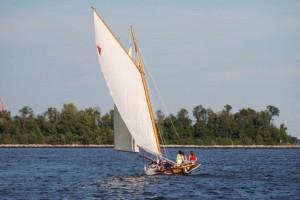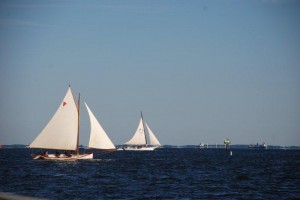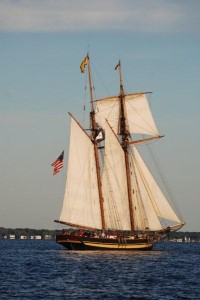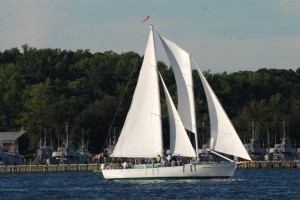We had an unusual combination of circumstances to make today’s cruise special and hopefully this will result in a unique blog. The most important part of the blog is that one of our guests, Luc Lapointe, is an excellent photographer and was kind enough to share his talent with us. Thank you Luc.
I have a poster hanging in my living room of a sandbagger.  I thought this was the only sandbagger I would ever see. Today we see a real sandbagger (“Bear”)! Originally the boats were catboats (1 sail) used for fishing. At the end of the day they would race into the harbor with their catch. One sailor, tired of losing races, added a jib and bowsprit and the class developed beyond fishing into racing with crew using sand bags for ballast for the upwind leg and then throwing the sand overboard on the downwind leg. Hence the term sandbag, meaning to use weight when it is needed most. A salesman, who works on commission, will keep some sales during a good month and report it in a poor month in order to meet a sales quote (sandbag). Notice the crew hiking out to keep this over-canvased vessel from capsizing. Woodwind has a 14,000 pound keel on the bottom of the vessel which does this work.
I thought this was the only sandbagger I would ever see. Today we see a real sandbagger (“Bear”)! Originally the boats were catboats (1 sail) used for fishing. At the end of the day they would race into the harbor with their catch. One sailor, tired of losing races, added a jib and bowsprit and the class developed beyond fishing into racing with crew using sand bags for ballast for the upwind leg and then throwing the sand overboard on the downwind leg. Hence the term sandbag, meaning to use weight when it is needed most. A salesman, who works on commission, will keep some sales during a good month and report it in a poor month in order to meet a sales quote (sandbag). Notice the crew hiking out to keep this over-canvased vessel from capsizing. Woodwind has a 14,000 pound keel on the bottom of the vessel which does this work.
Next we see the Stanley Norman and Bear sailing together. The Stanley Norman is a skipjack built in 1902. Skipjacks are oyster dredgers and the last fleet of working sailboats in the USA. Of all the vessels pictured, she is the only one that is not a replica.

The vessel with the square topsail is the Pride of Baltimore II, which is a replica of the Baltimore Clipper, an 1812 Go Fast design, used for smuggling or law enforcement.

Woodwind is a staysail schooner which represent 1920-1940 yacht design. The triangular sails we have are taking advantage from the new lessons learned from emerging aircraft industry; tall narrow sails instead of short and wide sails.

